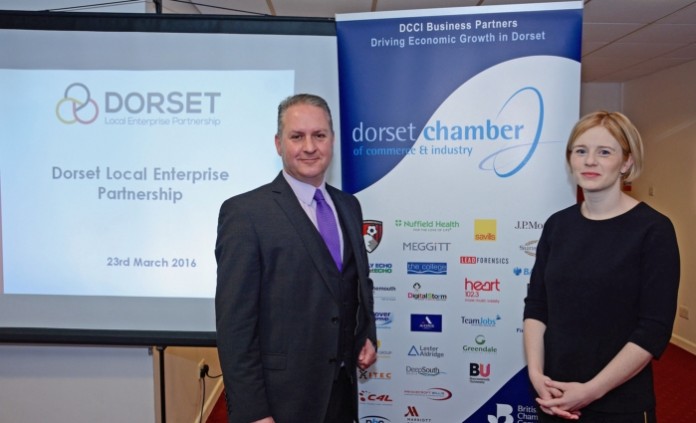Business leaders in Dorset have been given an insight into key economic priorities for the county over the next decade and beyond.
The business leaders forum, held by Dorset Chamber of Commerce & Industry (DCCI), which has 800 members, provided nearly 50 employers with an overview.
Linking up with Dorset Local Enterprise Partnership (LEP), the event at AFC Bournemouth’s stadium focused on the strategic economic vision for Dorset, with the aim of generating widespread prosperity in the town and wider county.
Ideas mentioned in the forum included the need for better infrastructure, such as a direct road link north to south through Dorset, from the M4 via Wiltshire, enhanced rail connectivity to reduce journey times between Weymouth and London and unified tourism marketing for the county.
Also highlighted were evident gaps in workplace skills for school leavers, no county-wide coverage by super-fast broadband and how we can better capitalise on the digital boom.
Bournemouth has become the UK’s fastest-growing digital tech. According to the TechNation 2016 report, digital technology industries accounted for 1.56m jobs, with an estimated turnover of £161 billion in the UK. Of those, nearly 14,000 were in Bournemouth and Poole, adding £350m to the value of the local economy.
Devolution, in which Dorset could be empowered by Whitehall to spend on projects with clear cost benefits to the regional economy, was also explained.
For example, business rates in various areas could be earmarked to fund specific projects locally rather than being redistributed by London elsewhere.
Dorset LEP itself is a business-led private and public sector partnership that aims to promote local economic growth and prosperity. Acting as a strategic gateway to funding, Dorset LEP supports and delivers projects of long-term economic benefit for all in Dorset through cross-sector partnership.
A total of £79 million for Dorset has already been successfully bid for by Dorset LEP through the Dorset Growth Deal, which aims to bring together local, national and private sector funding to unlock and unblock key housing and employment sites, create more highly skilled jobs and support economic growth.
Lorna Carver, Dorset LEP’s director, gave a presentation to the forum on the strategic economic plan for 2016-21.
She said: “We have ambitious growth plans for Dorset.
“Engaging with DCCI members about key economic priorities for the county and gaining their insight is vital.
“We need to further strengthen Dorset’s productivity, competitiveness and accessibility through innovation – ensuring a wide range of opportunities for businesses and employees across the region.”
Ian Girling, DCCI’s chief executive, said: “One of the areas we are keen develop, as the collective voice of businesses in Dorset, is policy, looking at issues affecting the local economy and identifying and acting on key economic priorities for the county over the next decade and beyond.
“This is about shaping the next pipeline of projects by Dorset LEP, about us being economic champions for Dorset.”
He added: “The DCCI’s business leaders forum is there to help inform Dorset LEP’s growth economic plan – Lorna said there was a strong need to consult with DCCI members as we look to support economic growth, employment and regional development.
“One of the challenges will be addressing the economic structure of Dorset – and the needs of both the urban and rurally based businesses across the county.”
The amount of central government funding received by LEPs across the UK is set to rise to £12bn between 2015-16 and 2020-21 via locally negotiated Growth Deals.





















